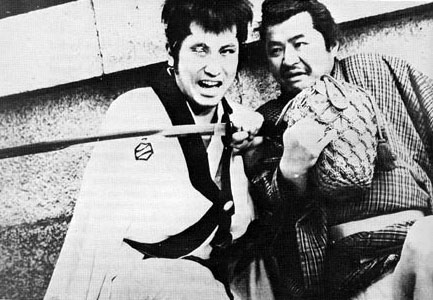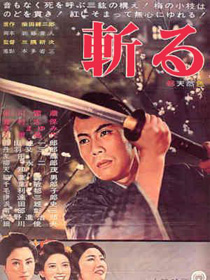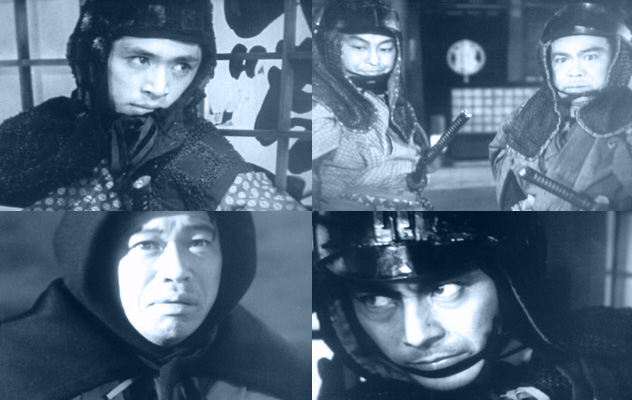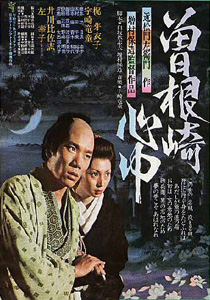
Readers of this blog know I'm a big fan of 60s auteur Yasuzo Masumura. I collect his stuff. I already had a dozen titles, and was pleased to add number 13 just recently,
Double Suicide at Sonezaki (
Sonezaki shinju, 1978). It's an adaptation of a play by Monzaemon Chikamatsu (1653 - 1725), the Shakespeare of Japan (however while Shakespeare only wrote 37 plays, Chikamatsu penned some 130). Chikamatsu often looked to real-life tragedies of the day for material, and this play was no doubt based, more or less, on real events.
It's a tale of star-crossed lovers: Young, noble clerk Tokubei (Ryudo Uzaki) and knockout, heart-of-gold prostitute Ohatsu (Meiko Kaji). Events conspire against our pure-hearted lovers: 1) Since Ohatsu only sleeps with Tokubei (and never charges him), her boss is fed up and plans to sell her off to some rich provincial samurai; 2) Tokubei is swindled out of a small fortune he owed his uncle/boss by the wicked Kuheiji (Isao Hashimoto); and 3) Kuheiji adds insult to injury by accusing Tokubei of attempting to swindle
him and subsequently beating the shit out of him with the help of some local cops. The public humiliation, personal injury and loss of face is too much for Tokubei -- he decides to end it all. And his lady love is on board as well. It's
shinju (lover's suicide) for the both of them. But what's this? Evidence of Kuheiji's heinous crimes comes to light. Kokubei is in the clear! His uncle decides to pay off Ohatsu's debt and bless their marriage. There's no longer any need for
shinju. If only they can be found and stopped in time …
Sonezaki Shinju is one of Chakamatsu's most beloved
sewamono (domestic drama) plays, a histrionic melodrama full of fiery furor and purple passion. Masumura has his actors play their parts in a highly exaggerated manner which I found quite entertaining. Isao Hashimoto as the evil Kuheiji is particularly vile and wonderful, all maniacal cackling and facial grimaces, like Richard III, Iago and Snidely Whiplash all rolled into one. Fans of the incomparable Meiko Kaji (
Lady Snowblood,
Female Prisoner #701: Scorpion) will want to see this film, as she's incandescently beautiful in it. I don't know if it's the exquisite period costumes, the hair and make-up, or simply her passionate performance -- maybe a combo, but one thing's for sure: she's utterly captivating. You just can't keep your eyes off her.
Then there's the violence. I have to say, I was a little shocked by the brutality in a number of scenes. Perhaps Masumura was trying to convey the reality of life in early 18th century Japan. Given the strict hierarchical structure of society during the Tokugawa period, I have to think this film offers an insight into how things really were for those who found themselves on the wrong side of law and/or convention. Taking some of the edge off is the fabulously incongruous score. As with many a samurai drama of the 70s, scenes of desperate men in topknots play out to the mellifluous strains of Spanish guitars or electric blues. It's not quite as bizarre as the waka-jawaka disco guitars of the
Hanzo the Razor series (the second installment of which was directed by Masumura), but there's no not noticing it if you're American and were born at a certain time in the 20th century …
As with all of Masumura's films, I've got two words of advice: See it! His was an impeccable talent, his themes invariably turning to the darkness of the human heart. He did everything from corporate espionage (
Black Test Car,
Giants and Toys) to sex comedy (
A Lustful Man) to ero-guro (
Blind Beast) to war films (
Red Angel) to lesbian love (
Manji) to Shintaro Katsu vehicles (
The Razor: The Snare,
Yakuza Soldier) to, here, Chikamatsu
sewamono. If any of these films sounds good to you, I'll say it again: See it!
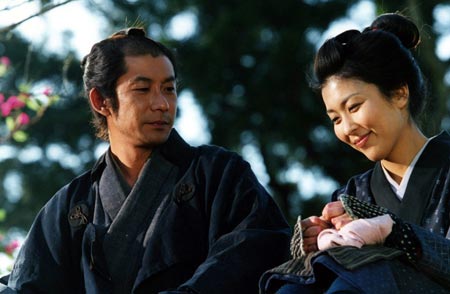 Hey, if you're in Portland, Oregon on Friday, December 10th and have nothing better to do, why not fall by the Northwest Film Center and take in a samurai film? Namely The Hidden Blade (2004), the second in Yoji Yamada's Samurai Trilogy. I'll be introducing the film; I also wrote a bit about it in Warring Clans, Flashing Blades. There will be a book-signing after the screening, so if you've already bought a copy (god bless you), bring it and I'll sign it. Otherwise, there will be copies available for purchase. See you there!
Hey, if you're in Portland, Oregon on Friday, December 10th and have nothing better to do, why not fall by the Northwest Film Center and take in a samurai film? Namely The Hidden Blade (2004), the second in Yoji Yamada's Samurai Trilogy. I'll be introducing the film; I also wrote a bit about it in Warring Clans, Flashing Blades. There will be a book-signing after the screening, so if you've already bought a copy (god bless you), bring it and I'll sign it. Otherwise, there will be copies available for purchase. See you there!

